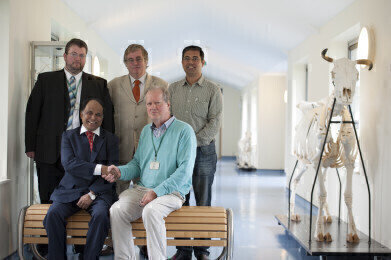-
 Photo: [back row, L-R] Dr Robert Atterbury, The University Of Nottingham; Dr David Harper, Chief Scientific Officer, AmpliPhi Biosciences; Sudhakar Bhandare, PhD student, The University Of Nottingham; [front row, L-R] Dr BL Sarkar, National Institute for Cholera and Enteric Diseases; Professor Paul Barrow, The University Of Nottingham.
Photo: [back row, L-R] Dr Robert Atterbury, The University Of Nottingham; Dr David Harper, Chief Scientific Officer, AmpliPhi Biosciences; Sudhakar Bhandare, PhD student, The University Of Nottingham; [front row, L-R] Dr BL Sarkar, National Institute for Cholera and Enteric Diseases; Professor Paul Barrow, The University Of Nottingham.
News & Views
UK-India collaboration seeks new cholera treatment
Jun 29 2014
A UK-India research partnership has won funding to tackle cholera, a disease which causes thousands of deaths around the world, and which is becoming increasingly difficult to treat. The University of Nottingham
The University of Nottingham and the National Institute for Cholera and Enteric Diseases, Kolkata, India, have won a grant from the UK-India Education and Research Initiative (UKIERI) to use viruses which infect bacteria (bacteriophages) to control Cholera which remains a major public health risk in India and parts of Africa and Central America. It is believed that around 60% of Vibrio cholerae bacteria isolated from cholera sufferers are resistant to tetracycline, an antibiotic often used to treat the disease. That figure is likely to increase and the research will look into alternative treatments for the acute intestinal infection.
Professor Paul Barrow and Dr Robert Atterbury, from The University of Nottingham’s School of Veterinary Medicine and Science, and Dr BL Sarkar, from the World Health Organisation-recognised National Institute for Cholera and Enteric Diseases, will work jointly on the collaborative research study.
The project will investigate the isolisation and characterisation of bacteriophages that show ability to infect a broad range of epidemiologically significant strains of Vibrio cholera and then use these strains to reduce the burden of antibiotic resistant to the disease.
Professor Barrow said: “This study is timely, as multi drug-resistant bugs have become a major global threat to health and there is a clear need to focus on a low-cost, biological alternative to antibiotics. By working with the National Institute for Cholera and Enteric Diseases, we look forward to learning from each other and developing long-term collaborative expertise in these areas.”
Dr Sarkar added: “This is a prestigious collaboration and after working on cholera for decades, I am excited that there is a possibility for a further research study in this area.
This has the potential to benefit the health of people across the globe, particularly in Asia and Africa. I am hopeful by the end of study that we can find a ‘phage therapy’ as an alternative of the antibiotic for the treatment of cholera disease.”
The initial project will last for two years, with both institutions hoping to collaborate further.
Digital Edition
Lab Asia 31.2 April 2024
April 2024
In This Edition Chromatography Articles - Approaches to troubleshooting an SPE method for the analysis of oligonucleotides (pt i) - High-precision liquid flow processes demand full fluidic c...
View all digital editions
Events
May 05 2024 Seville, Spain
InformEx Zone at CPhl North America
May 07 2024 Pennsylvania, PA, USA
May 14 2024 Oklahoma City, OK, USA
May 15 2024 Birmingham, UK
May 21 2024 Lagos, Nigeria




.jpg)












